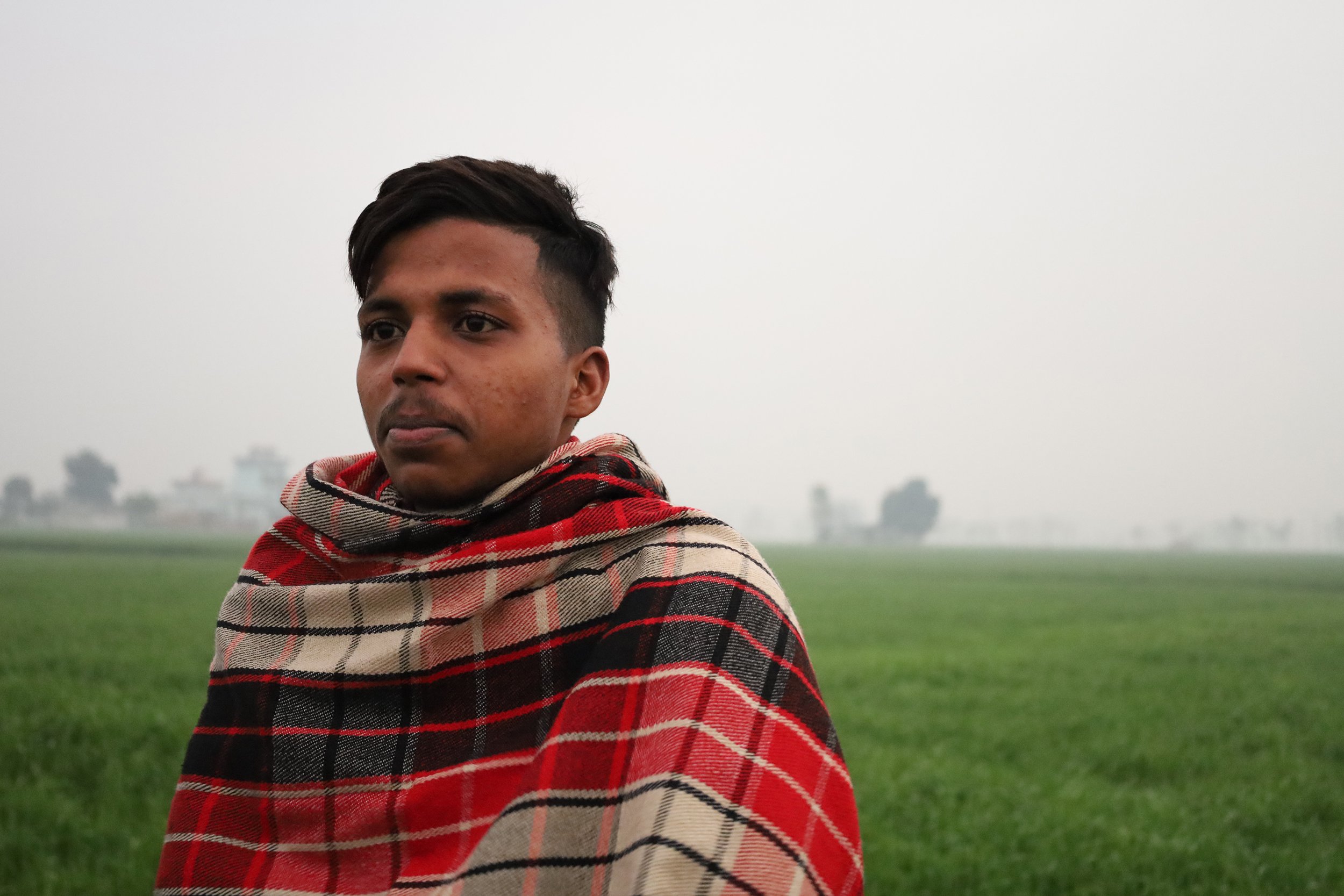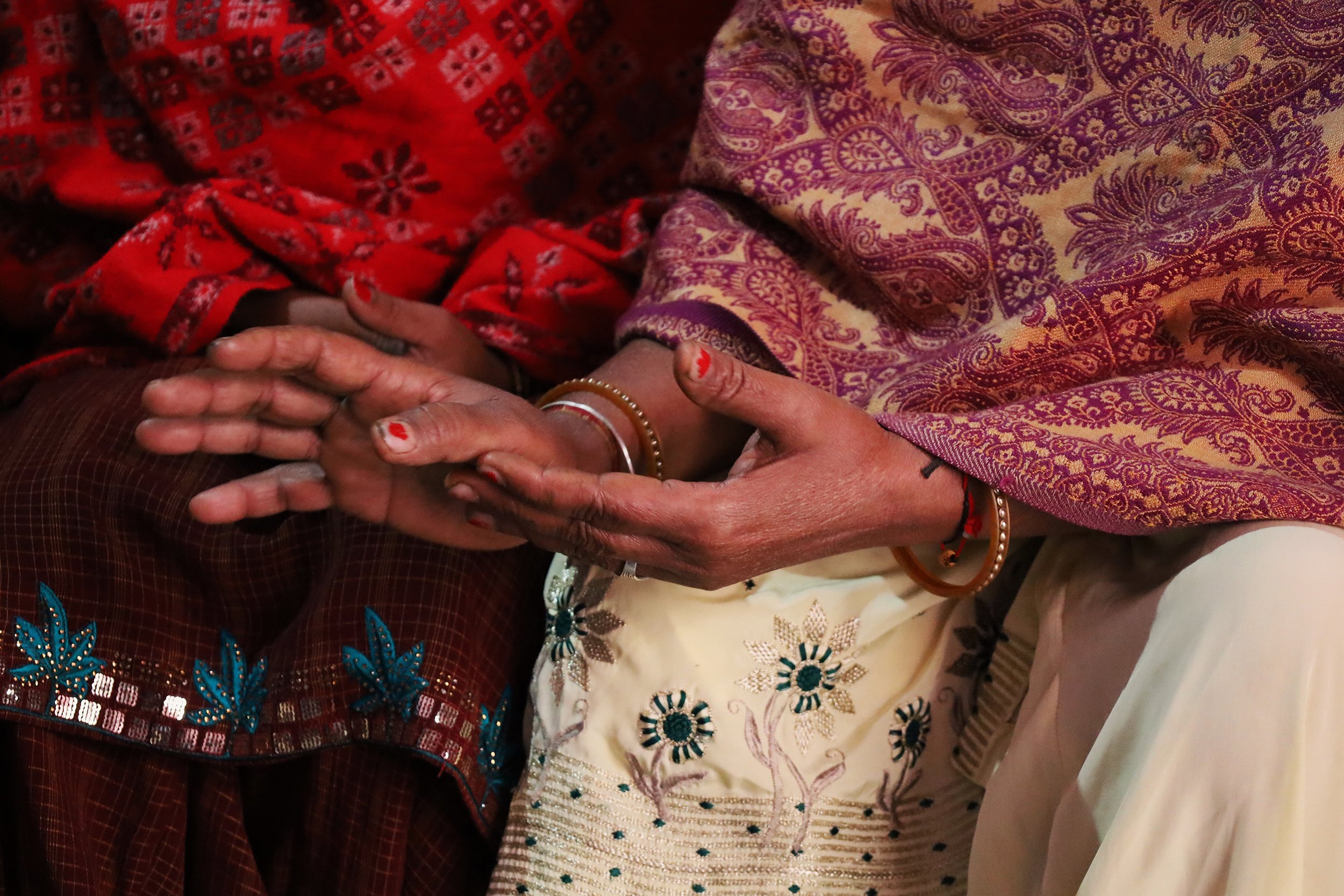Mending the fractures
An eldest son from a rural village in Haryana vows to protect his family and break the cycle of abuse imposed by his alcoholic father.
By Alyssa Malyon
Sachin Tansal, 18, reflects on the lasting effects of his father’s actions while walking out to the Gohran fields Jan. 8. Sachin has stepped up to be the man of the house, working to support his mother and act as a protector. “When I leave, I’ll make sure that my father can’t hurt my mom,” Sachin said. “I want to make sure she’s safe, 24/7 safe.” | Photo by Madelyn Kremer
Sachin Tansal picked up a phone call from his mother, Shimla, as he worked at a grocery store in the village of Siwan, Haryana last August. He heard his mother’s muffled cries through the phone and took off running. Swinging open the wooden gate to his home, he saw his drunken father, Ramkaran, beating his wife — Sachin’s mother — with a fire stick. Sachin pushed his father to the ground, picked up a brick and hurled it at Ramkaran, fracturing his leg.
For a month following the incident, Sachin watched as his mother tended to the bedridden man who hit her across the face and chest, causing swelling and bruising so severe she could hardly see through her slitted eyes. Still, she cooked for her husband every day, massaged his leg and purchased medicine for him that she could barely afford. Shimla felt it was her duty as a wife to care for him no matter how he treated her, and worried that if she kicked him out, the other villagers would ridicule and shun her.
“Their father, he’s always been like that. He doesn’t give us anything — it’s like he’s against us,” Shimla said six months after the fight. “But what am I supposed to do?
Sachin, 18, his younger brother Anmol, 15, and three older, married sisters, Babie, Geeta and Beeta are no strangers to their father’s abuse, alcoholism and lack of contribution to the family’s well-being. But they used his example as inspiration to pave a new path for themselves, their children and the future generations. This new path, they hope, will lead to a life where domestic violence is uncommon.
Four years ago, Geeta moved home with her 1-year-old son and 2-year-old daughter to escape her verbally abusive husband. She swore she would never allow her children to experience the same fate, so Geeta remained in her childhood home for four months — until her husband and in-laws appeared at the family home on multiple occasions, begging her to return and promising that the abuse would cease.
In Gohran, a rural village in Haryana of less than 1,500 people, many women endure similar abuse at the hands of their husbands, but according to Shimla, hardly anyone divorces for fear of making their situation worse. Shimla said she would rather stay with Ramkaran because she knows the type of man she’s dealing with, but fears the possibility that remarriage would subject her to a life with a man that would mistreat her more than her husband already does.
Sachin did not always side with the women of his family, however. Because of his age, gender and the influence of traditional gender roles in rural India, he viewed his father — who spent the family’s money on alcohol and rarely worked a consistent job — in high regard. Sachin wished his mother and sisters would stop criticizing him and let him be.
“When he used to fight [with my mother] before, we were kids, and I didn’t know any better,” Sachin said. “When I realized what was happening, I knew my mother was right. I feel a responsibility to protect them now.”
As he matured, Sachin began to realize the true nature of his parents’ relationship. The faultless version of his father Sachin clung to slowly withered away with each bruise that appeared on his mother.
But it wasn’t until Sachin’s best friend took his own life at 16 that his outlook on life changed forever. He felt as though nobody in the village cared what had happened — they accepted his death as a “mistake” and moved on with their lives.
“After my friend’s death, I didn’t trust anybody in the village,” Sachin said. “I thought everybody was selfish.”
Before that loss, Sachin described himself as “useless,” saying he’d “roam the streets and just pass the day” — but after experiencing grief of that magnitude, Sachin committed himself to making the most out of the life he’d been given and vowed to keep his family safe.
Around the time of his friend’s death, Sachin met Amarjeet Singh, a highly respected man in the community, when a village member wrongfully accused him of stealing a cell phone. Although Sachin was innocent, the villagers refused to listen until Amarjeet defended his character.
Amarjeet placed trust in Sachin, and Sachin did the same.
“My mentor, [Amarjeet Singh], changed my life,” Sachin said. “He showed me a different path and he taught me how to talk to people with respect.”
Amarjeet taught Sachin to take care of his own and kept him from using any substances — lessons he never learned from his father.
Anmol Tansal, 15, poses in front of the field where he helps his brother in the mornings. Anmol’s brother Sachin provides for the family through work while Anmol stays at home and takes care of their mother. “My brother is still a child and he spends some money here and there, but he’ll learn,” Sachin said. | Photo by Mild Du
_____
Ramkaran’s presence around the family’s two-bedroom concrete home has dwindled over the last few years. At times, he has left for months with no explanation. With growing financial burdens and the lack of a steady income, Sachin stepped up. But his education suffered.
“He had to take on the responsibility of the house and he had to leave school,” Shimla said. “If the child is stressed at his home and his father isn’t right, what can you expect from him [at school]?”
“When I leave, I’ll make sure that my father can’t hurt my mom. I want to do something with my life. I won’t be like my father, who didn’t do anything.”
After failing two classes in the 10th grade, Sachin was forced by the school to drop out. Soon after, in October 2022, he began a carpentry apprenticeship. He worked there for a few months until he could no longer withstand the verbal abuse from his mentor. During his second apprenticeship in Siwan, a nail pierced through the middle finger on his left hand. At the hospital, Sachin watched as the doctor severed off half of his finger. He then swore never to take another job in carpentry.
Still, he wanted to provide for his family, so he took odd jobs installing closed-circuit television cameras and working at a local grocery store.
Every rupee Sachin earns, he gives to his mother.
“Even if I earn 10 rupees [12 cents], I’ll still give it to my mother,” Sachin said.
Shimla and Sachin earn for the household — pooling every penny they earn and working together to make financial decisions for the family.
In a few years, Sachin dreams of saving up enough money to move abroad, where he could make a higher income to send back to his family.
“When I leave, I’ll make sure that my father can’t hurt my mom,” Sachin said. “I want to do something with my life. I won’t be like my father, who didn’t do anything.”
Three weeks ago, after Ramkaran’s leg healed well enough for him to walk, he stole a few hundred rupees and left to buy a bottle of alcohol. Returning home drunk, he found Shimla resting alone. She was recovering from her second medical procedure that month to repair a damaged nerve after a nurse made a wrong incision during her first procedure to remove potentially cancerous ovarian cysts.
Shimla Devi tells the story of how she got the bruises on her face and body. Shimla has suffered abuse at the hands of her husband, Ramkaran, but continues to care for him. “He ripped my hair out, hit me with a rod [across my face] and on my shoulder,” Shimla said. | Photo by Madelyn Kremer
Ramkaran asked Shimla to clean the house, but when she told him she was too tired, he picked a fight with her. His words soon turned to violence after discovering she had gone into the fields earlier that day to pick pea pods. Shimla worked for most of the day, making 200 rupees to pay off a 1,500-rupee debt Ramkaran loaned from the farmer. In Ramkaran’s mind, if she could go to work, she could also clean the house.
He grabbed her by the hair, ripping a chunk from her scalp, and dragged her outside. Once again, Shimla reached for her cell phone to call the one person she could rely on for help — Sachin.
But before she could press the dial button, Ramkaran snatched the phone from her hand, released his grip on her hair and bolted down the dusty path.
“He has not returned home after that; he’s afraid the boy will beat him,” Shimla said. “[Sachin] will not let him touch me anymore.”
But uncertainty still lingers in the household, and Sachin lies awake at night with thoughts of his father’s return.
“I can’t sleep sometimes and I get nightmares,” Sachin said. “I get up and check up on [my mother] every time I wake up. Wherever I go, I am wondering if she’s doing okay.”
Sachin can only hope his father stays away for good this time.



